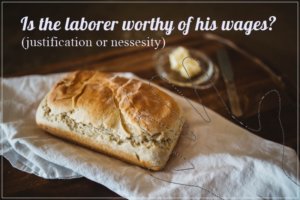Is the laborer worthy of his wages?August 2, 2018

Every few years I get into one of those conversations about the scriptural phrase ‘a labourer is worthy of his wages‘. Why do I give everything I make away? People ask. Why don’t I sell more, put in a paywall, market myself, que said phrase! It’s an oft quoted scripture and, as per usual, hit us this spring as we were’t exactly financially stable. Living on donations is not a sustainable life, or is it?
The phrase is used twice, once by Paul in respect to church leaders and the other time by Jesus himself. Their context shows the very different meanings they hold.
Paul drops his bit in a passage about rebuking the church community. He points out that those who serve full time, working hard preaching and teaching, should not be denied an income. He uses the analogy of a leaving a threshing mule unmuzzled, that is, allow the animal to feed from the abundance he is helping provide. Basically, why can’t I just bend down my head like the mule and feast as other do? However, by using the analogy and then going on to talk about challenging the church leadership Paul is advocating a proportional response. That’s a tough path to navigate because proportional response is very cultural specific.
Jesus on the other hand uses the phrase very differently, he uses it when sending out his disciples, he instructs them to take no bag nor spare sandals for the road, and to accept hospitality as “the laborer is worthy of his wages“. This isn’t bending your head down and taking but awaiting a hand to lift the grain to your lips.
It’s tempting to be drawn towards Paul’s usage of the phrase, to see ourselves as deserving, to place a price on our time and effort and ideas. It’s more challenging to follow Jesus’s usage, the master who wandered relying on the generosity of others, who accepted the gifts that would sustain him and gave more generously than his companions could comprehend.
It’s not only challenging, it’s seen as naive to trust Isiah 58:11 (The Lord…he will satisfy your needs) and to not monetise your assets. It’s seen as foolish to undersell yourself because your value of money is changed by foreign viewpoints. It’s seen as sponging off others rather than being self supportive if you choose to ask for donations rather than sell outright.
Back in that financial rough patch it was hard to feel confident in being radically generous and blessing with abundance simply because we have been blessed abundantly. We are, indeed, worth our wages and giving people an opportunity to voluntarily pay towards the work they were benefiting from was certainly a need. Mirrored generosity was always my aim. Then someone threw Thessalonians into the mix;
Make it your ambition to lead a quiet life: You should mind your own business and work with your hands, just as we told you, so that your daily life may win the respect of outsiders and so that you will not be dependent on anybody.
1 Thessalonians 4:11-12
With this passage we remove from the equation wages or rewards, we remove the notion of what we deserve. We are instead lead to a more truer notion of humility, community respect and long term balance. In this passage I hear the lord echo ‘I have put this in your heart to do, Freely you have received; freely give‘. I see it less about advocating self sufficiency and more as producing fruit according to his calling on us. We are not dependant on anybody because we receive donations, we are trusting in God’s provision and his hand to lift the grain to our lips.
Let us not become weary in doing good, for at the proper time we will reap a harvest if we do not give up.
Galatians 6:9
Image Credit: Brooke Cagle


Leave a Reply